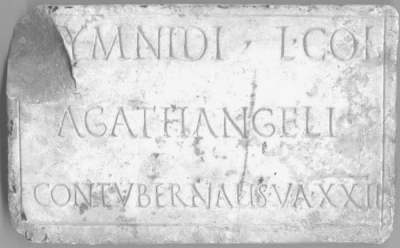
A MEMORIAL STONE


AGATHANGELI
CONTUBERNALIS V A XXII
Freedman of Hymnidius from Cos Agathangelus [his stone]
A soldier. He lived Years 22
Putting the words into a more readable order, we have:
As commentary for details of the inscription, note the common abbreviation L. for libertus, indicating that the person was a member of the large freedman or libertus class, while the first line indicates his former master's name as a matter of identification.
COI is adjective genitive singular, referring to the Greek master's identity as coming from the island of Cos.
CONTUBERNALIS means literally "mess-mate" from con+taberna, a commonly used word for a soldier in the ordinary ranks. The standard abbreviations V. and A. stand for "vixit" 'he lived' and "annos" is the accusative of time-span 'for years' = 22.
Agathangelus is Greek for "brave-messenger" and a clearly Christian name, found as early as the time of Tiberius at Pompeii, and as far afield as Agathangelus the bronze-smith in England at an indeterminate date. The name is later used by martyrs and appears in medieval and Late-Latin titles as a frequent Christian name.
There is something pathetic about viewing an actual funeral inscription from such an ancient date which marks the abrupt death of one of the myriad young Roman soldiers who died for one reason or another in military service.
But there is an echo of this inscription in the world of today. In this year 2004 the United States military is at war in the Middle East, and among the soldiery are many young Latino immigrants who are serving in the US army. Their names are now perhaps Lopez and Gonzales, but they are the exact analog of the Greek freedman Agathangelus who was also serving in a national army against national foes on a global landscape. For those who are under arms as a way of winning citizenship, then as now, this is a hard road which often has a bad ending, as here.
Have we learned anything from history, or is it the same disposable use of young men who go to fight the enemy in foreign parts? Is it forever both the young and also the new citizens who have to bear the brunt of international warfare? Will someone be reading our inscriptions in Arlington two thousand years hence, and what will they be thinking?
Page 19 ~ VESTAL VIRGINS